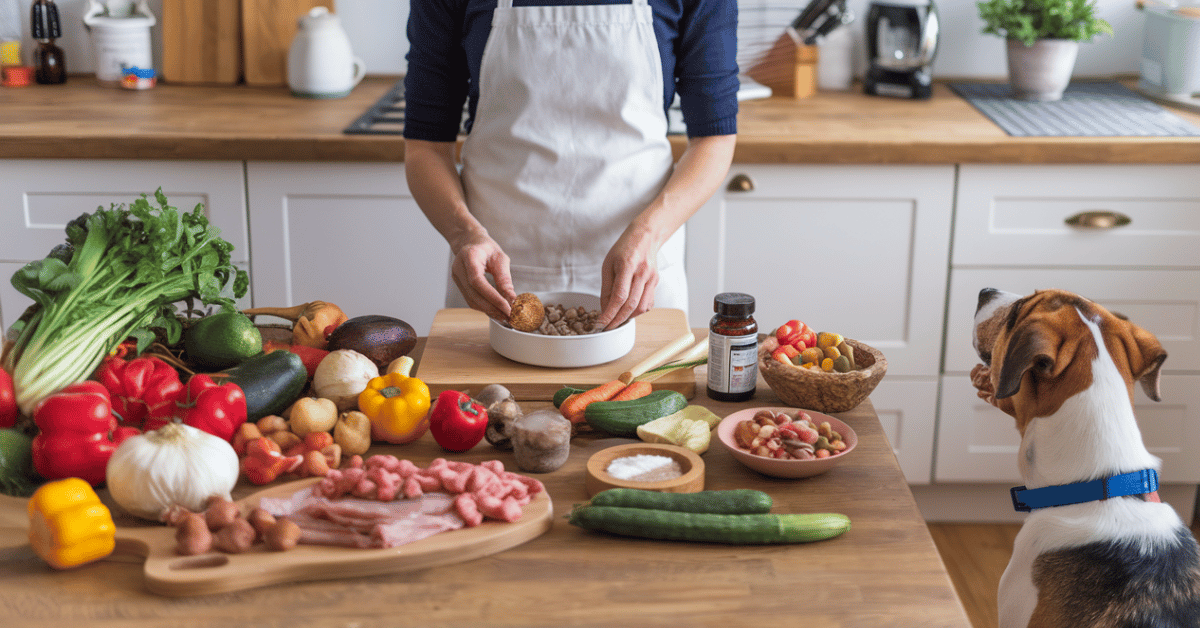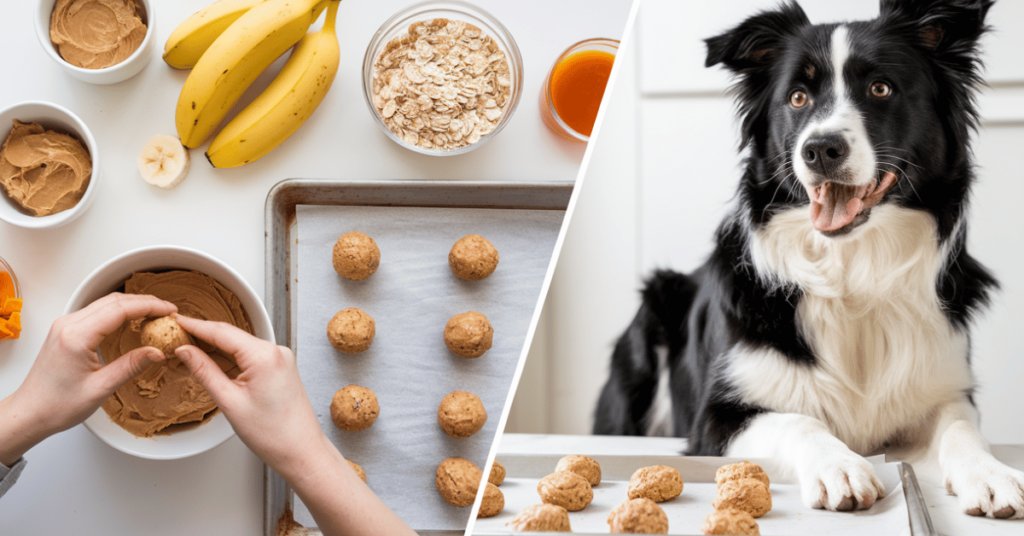Benefits and Risks of Homemade Dog Food Recipes
Homemade dog food recipes are soaring in popularity among pet parents who want to take the reins on their furry friends’ diets. It’s like being a five-star chef, but your patrons are your pets, and every meal is a tail-wagging occasion.
While the perks include controlling ingredients to avoid allergens and enhancing mealtime with personalized dishes, there’s a flip side to consider. Not all home-mixed meals are packed with the necessary nutrients your dog needs to thrive.
In fact, many nutrients commonly missed in homemade dog food recipes can turn your kitchen into a place of nutritional misses rather than hits. Ensuring your dog receives a balanced diet means paying attention to these often-overlooked essentials, safeguarding your pup’s health and happiness.
Understanding Balanced Diets for Canine Health
When it comes to feeding Fido, balance is more than just a buzzword; it’s a must for keeping your pooch perky and healthy. Each nutrient plays a starring role in canine health, supporting everything from bone strength to brain function. But here’s the scoop—missing out on these key dietary players can lead to more than just a grumpy pup.
Nutritional deficiencies can sneak up on you, manifesting in ways that are hard to spot until they’re serious. So, while your dog might not turn into a superhero with the perfect diet, missing ingredients can certainly turn them into a listless sidekick faster than you can say “fetch.”
Top 10 Missed Nutrients in Homemade Dog Food
Calcium Deficiency Dangers in Dogs
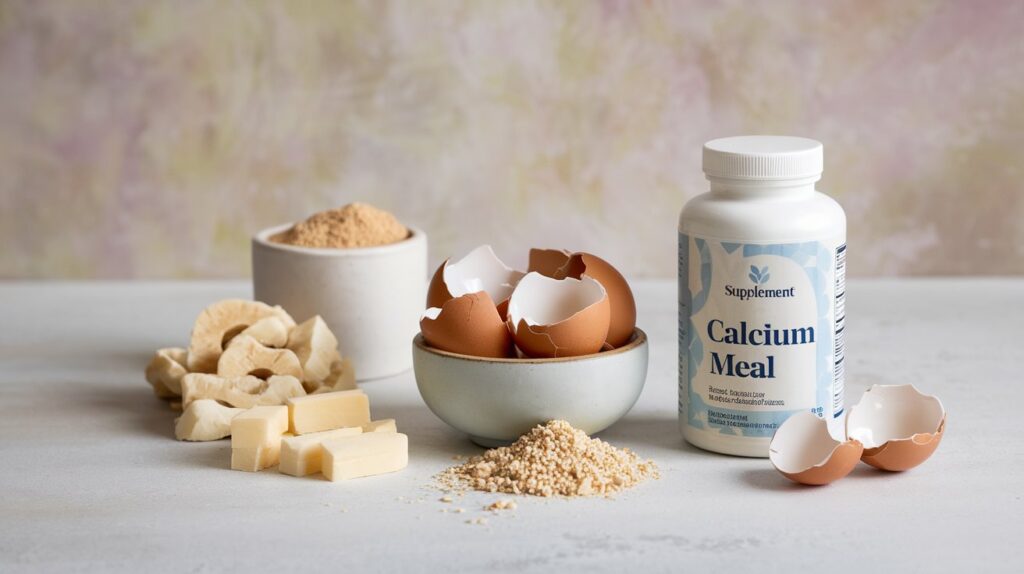
Let’s bone up on calcium! It’s crucial for more than just a charming canine smile; it’s the cornerstone of your dog’s bone health and muscle function. If your homemade menu lacks sources like bone meal or finely ground eggshells, your dog could be missing out big time. A lack of calcium can lead to fragile bones and dental disasters, making an enthusiastic game of tug-of-war a risky business.
The Role of Zinc in Canine Nutrition
Next up, zinc—the unsung hero of your dog’s diet. This mighty mineral supports everything from immune defense to skin integrity. However, it’s notoriously tricky to pack enough zinc into a diet without resources like oysters or a good mineral supplement. Without it, you might notice your pup sporting a lackluster coat or battling frequent infections. Think of zinc like the shield in a knight’s armor—without it, your dog is left vulnerable to the elements.
Balancing Omega Fatty Acids for Optimal Health
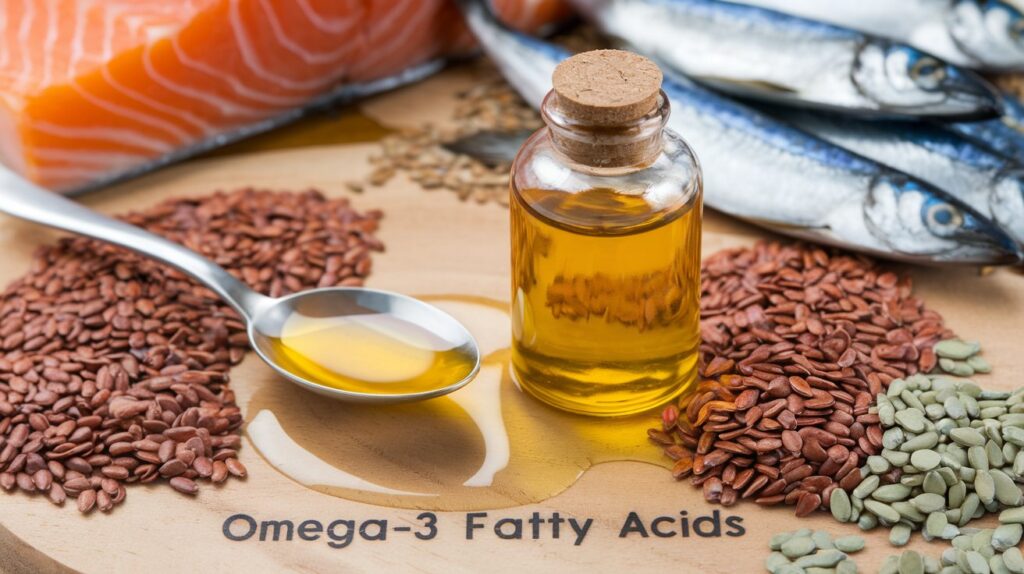
Fats are fabulous, but only when they’re balanced. Omega-3 and omega-6 fatty acids should be in perfect harmony to fend off inflammation and keep your dog’s cells healthy and humming. If your recipe’s all chicken and beef, you might be loading up on omega-6s and skimping on omega-3s, leading to potential health hiccups. Integrating sources like fish oil or flaxseeds can turn the tide and ensure your dog’s diet is as balanced as a yoga instructor.
Vitamin E: Essential for Canine Antioxidant Protection
Vitamin E is not just a trend in human skincare; it’s essential for your dog’s cell defense system. This vitamin is a master of mop-up operations, protecting your pup from oxidative damage. Meat alone won’t cut it; consider adding wheat germ or sunflower seeds to sprinkle some antioxidant magic into their meals. Remember, a little Vitamin E goes a long way to keep those vet visits at bay.
Why Linoleic Acid Matters in Dog Food
Linoleic acid, a critical omega-6 fatty acid, is pivotal for skin health and a glossy coat. While coconut oil has its fan club, it’s low in linoleic acid, which means it’s not the best solo act for your dog’s diet stage. Mix it up with plant-based oils like safflower or hemp oil to ensure your pup’s coat stays as shiny as a freshly waxed car.
Manganese: Overlooked Yet Vital
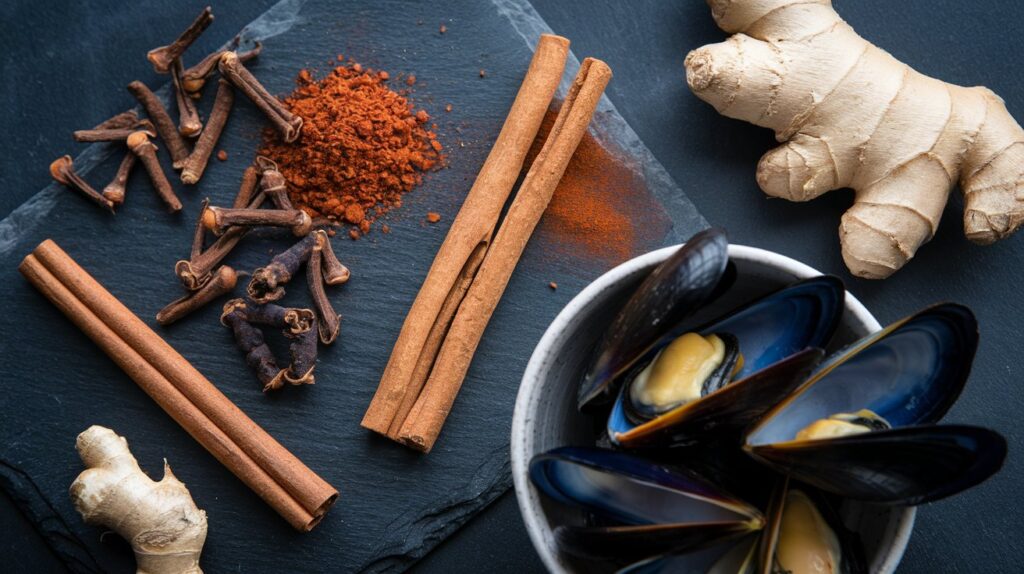
Diving deeper into the nutrient treasure chest, let’s talk about manganese. This lesser-known mineral might not get the limelight like others, but it plays a critical role in your dog’s joint health and energy metabolism. Think of manganese as the oil in your pup’s joint engine, ensuring smooth moves and zesty zoomies. Natural sources include cloves, ginger, and mussels—adding a pinch or a splash can seriously upgrade your dog food concoction.
Ensuring Adequate Vitamin D in Dog Diets
Sunbathing isn’t enough for your furry friend to soak up adequate Vitamin D—especially with all that fur in the way! This nutrient must be sourced from the diet, primarily through fortified foods or ingredients like fatty fish. Without it, your pup could face a raft of health issues, from bone malformations to a compromised immune system. It’s like forgetting the sunscreen on a sunny day—not a good idea!
Iodine’s Role in Your Dog’s Diet
Here’s a fun fact: iodine is a must-have for your dog’s thyroid health, which controls everything from metabolism to mood. Low iodine can lead to sluggish behavior or even weight gain. Kelp or seaweed in your dog’s diet can be like sprinkling a little thyroid magic on their meal. Just a dash will do!
Copper and Iron: Essential Minerals for Canine Health
Copper and iron are the dynamic duo of the nutrient world, supporting everything from red blood cell function to coat color. Without enough copper, sourced ideally from liver, your dog might not only lose its sparkle but could also face serious health issues like anemia or bone pathologies.
Similarly, iron is non-negotiable for keeping your pup lively and energetic. Ensuring your homemade recipes include rich sources like heart or beef liver can keep the tail wagging vigorously.
Pro Tip: While copper is crucial for your dog’s health, too much can spell trouble. Excessive copper intake may lead to toxicity, causing liver damage and other serious health issues, so always ensure balanced supplementation
Selenium, Folate, and Potassium: Crucial Yet Often Forgotten
Rounding off our list, these nutrients are the unsung heroes of your dog’s diet. Selenium boosts immune health, folate aids in cellular growth, and potassium is vital for nerve function and muscle health. Mushrooms, mustard greens, and beet greens are excellent sources that can fill these gaps. Missing out on these could lead to a pup that’s less than peppy, so sprinkle these into your recipes like fairy dust for your canine’s vitality.
Signs Your Dog May Have a Nutrient Deficiency
Spotting a nutrient deficiency in your dog can be trickier than finding a quiet puppy at mealtime. These signs can be subtle and slow to manifest, but keeping a keen eye can make all the difference. Does your pup have a dull coat, itchy skin, or seem unusually tired? Maybe they’re not as enthusiastic about those morning jogs anymore?
These could all be whispers of nutritional needs not being met. Just like us, dogs will tell you when something’s off, but you have to know how to listen. So, keep an eye out for signs like brittle nails, poor growth, and even mood changes—yes, dogs can get grumpy too!
Expert Advice: The Role of Veterinary Nutritionists
When it comes to the perfect dog diet, sometimes you need to call in the big guns—enter the veterinary nutritionist. These experts are like the nutrition ninjas for your pups, specializing in everything from dietary needs to food formulation. Think of them as your go-to resource for turning your homemade dog food from ‘meh’ to ‘paw-some.’
They can analyze your recipes to ensure they’re balanced to the T, preventing those sneaky deficiencies and boosting your dog’s overall health. It’s like having a secret recipe that only the best chefs know—except it’s for your dog’s dinner.
Final Tips on Nutrients Commonly Missed in Homemade Dog Food Recipes
Homemade dog food doesn’t have to be a nutritional minefield. With the right knowledge, tools, and expert advice, you can whip up meals that are as nutritious as they are delicious. So, keep those tails wagging by giving your dog the best seat at the dining table—right next to you, with a bowl filled with perfectly balanced, home-prepared goodness. And remember, when in doubt, reach out to a pro to keep those doggy dinners on point!
At Sweet Purrfections, we’re dedicated to providing you with the best care tips for your dog and cat, ensuring they live their happiest and healthiest lives. From balanced diet advice to fun health hacks, consider us your go-to resource for all things pet care.
Feel free to bark back in the comments or join the conversation on social media. Share your experiences, ask questions, or simply connect with fellow canine and feline health enthusiasts. Let’s keep our beloved pups and kitties thriving, one homemade meal at a time!
Meet Sean, a fintech whiz with a penchant for pet purrs and blockchain buzz. After a decade of fintech feats, Sean’s tech talents leaped from ledger lines to litter lines, driven by a passion for pets and a vision for a more connected pet care community. With three critter companions as co-pilots, Sean launched this blog to share a treasury of pet-friendly tech tips and tales.

